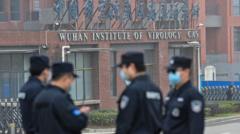In the heart of Shanghai's Menghua Jie, also known as Dream Flower Street, the visible remnants of the harsh Covid-19 lockdown that extended for months in 2022 are fading, but the emotional scars linger. Fu Aiying, who owns a stir-fry restaurant in the area, recalls the overwhelming smell of rotten groceries when officials took her to a quarantine facility without notice. With the dismantling of testing booths and the disappearance of friends and neighbors, the neighborhood is set to face demolition as authorities claim its cramped houses facilitated the virus's spread.
Despite some businesses beginning to resume operations, many storefronts still stand closed and abandoned, echoing the emotional void left after 26 million residents endured a grueling lockdown. On reflection, many residents are left questioning their personal dignity while facing a reality where basic necessities like food and medicine became elusive.
Fu Aiying, 58, reflected on her time spent in a mass quarantine center for 39 days, stating, “I don’t have a temper anymore. I don’t have a personality anymore.” This sentiment underscores a common feeling among many who faced not only the immediate physical constraints of quarantine but also a profound emotional toll that reshaped their identities. As the city rapidly changes, the psychological legacy of Covid-19 in Shanghai proves just as lasting as the physical alterations to neighborhoods like Menghua Jie.




















